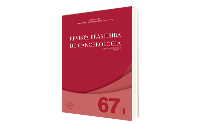Clinical Epidemiological Profile and Global Survival in Patients with Pancreatic Adenocarcinoma at a Reference Hospital in Oncology
DOI:
https://doi.org/10.32635/2176-9745.RBC.2021v67n1.967Keywords:
Pancreatic Neoplasms/epidemiology, Survival Analysis, Delayed DiagnosisAbstract
Introduction: Pancreatic malignant neoplasia represents one of the highest mortality neoplasms worldwide, almost always associated to a dismal prognosis, especially when associated with lymphatic spread and to distant organs. Objective: To assess the global survival in patients with pancreatic adenocarcinoma treated at a specialized oncology center. Method: From January 2011 to December 2014, 71 medical records were retrospectively evaluated. The data were analyzed using the STATA software version 14, using the Kaplan-Meier curve and the Cox regression. The confidence interval used was 95% (p<0.05). Ethical and confidentiality principles have been secured. Results: There was predominance of males, mixed race and over 61 years of age at diagnosis. As for the clinical characteristics, 87.8% of the tumors were located in the head of the pancreas. Abdominal pain (92.7%) was the most frequent symptom, followed by progressive weight loss (79.3%) and jaundice (57.3%). The three-month follow-up survival rate was 48.4%. Conclusion: The study shows that pancreatic cancer has an extremely negative repercussion, since most patients are diagnosed in advanced stages of the disease, hindering the possibility of curative treatment.









